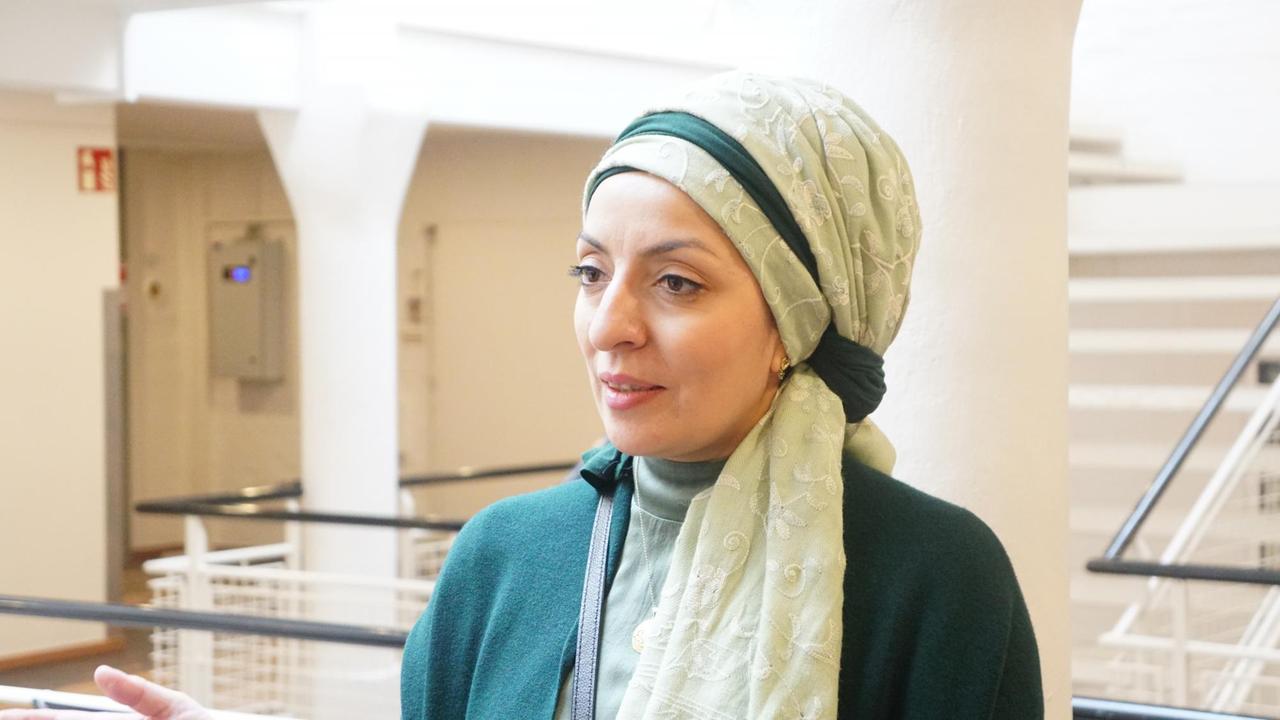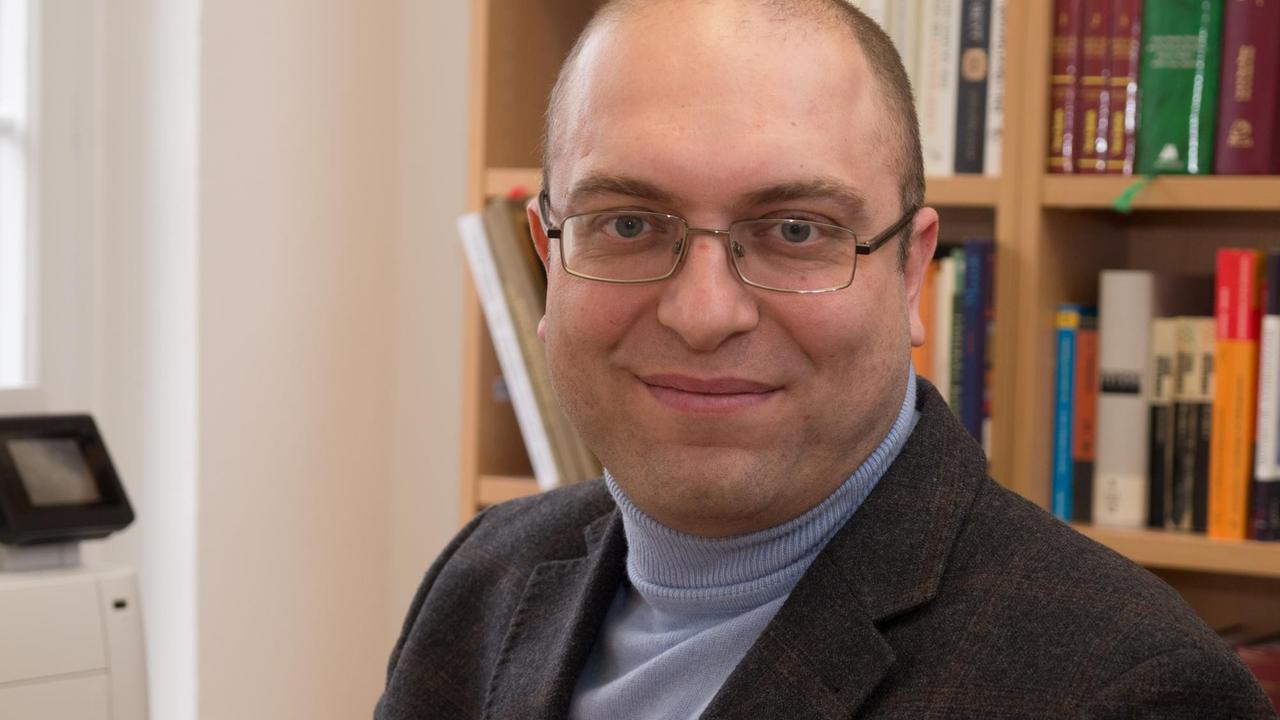A flute like the breath of God

The Naqshbandis’ remembrance of God begins quietly, almost imperceptibly. Sheikh Esref Efendi, the group’s spiritual leader, sits in an armchair in the Sufi Centre Rabbaniyya on the shores of Lake Constance. He is wearing a long gown over his shirt, on his head is a white turban. The meeting is being streamed live, so people can follow it online from the comfort of their own homes. The sheikh is holding a string of prayer beads, which slowly slides through his fingers. His students sit on the floor in front of him.
The Naqshbandi order is one of the best-known Sufi orders in Germany. Yet Sufis – Islamic mystics – make up only a very small proportion of Germany’s Muslim population, estimated at around one percent. In the history of the Islamic world, however, they have played an important role for centuries, in many places exerting a decisive influence on Middle Eastern high culture.
Overcoming the self to find God
In the Sufi Centre Rabbaniyya, the men and women of the Naqshbandi order meet at least once a week for communal remembrance of God, a meditative form of prayer known as dhikr.
They appear entirely lost in contemplation, giving themselves up to God, individuals seeming almost to dissolve into the group. And that is the aim, says Feride Funda-Gencaslan, the chair of the Rabbaniyya community in Germany. In order to get closer to God, as the Sufis see it, you have to overcome your own ego: "In Sufism, everything centres on symbolism, and the symbolism of the unity of God, the symbolism of remembering God, remembering the divine presence; we always remember that God is near, we feel it and sense it. For the holy Koran says: 'Allah is closer to us than our own jugular vein'.”

The attentive listener will notice the musical, rhythmic quality of this form of meditation at once. And in fact, the use of sound and music is typical of Islam’s mystical tradition, says Erdal Toprakyaran, professor of Islamic theology at the universities of Tubingen and Lucerne:
"Music plays a very central role in Sufism. Not in all the Sufi traditions. There are actually some that don’t use music for their own spiritual development. But they’re more in the minority."
Sufis use regular, mantra-like repetition of certain Koran verses and hymns of praise to the Prophet Muhammad to lift their hearts, sharpen their awareness and in this way bring themselves closer to God.
Intense communal devotion
Dhikr can be performed alone or communally, silently or out loud. In many Sufi orders, silent, individual meditation is part of the daily spiritual practice. On top of this, most orders also hold a weekly communal dhikr.
Another Sufi order, the Burhaniyya, shows just how intense this communal remembrance of God can become. Here, the dhikr begins with the invocation of the angels, prophets and saints. Then one of the men will intone the "La ilaha illa-llah". It’s the first part of the Islamic profession of faith: "There is no god but Allah".
The person who leads the Burhanis’ dhikr is called the "Bust"; he sets the rhythm with clapping, mantras and breathing exercises. Then one of the other men begins to intone a "qasida", a hymn of praise to God, the Prophet, or one of the order’s spiritual leaders in the form of a poem. The men stand up, turn their upper bodies from left to right or sway on the spot.
Fast songs are interspersed with calmer solo singing. But overall, the level of intensity increases, the singing growing louder and louder, until the "La ilaha illa-llah" gradually becomes an "Allah, Allah" – and finally, only the breath remains.

God dwells in the music
"It takes you to another world. You’re not here anymore; you give no thought to worldly things. You’re actually somewhere completely different. The beat of the music reminds you of your creator. Of what your heart is actually doing the whole time."
That is how a young woman who is taking part in the dhikr describes it, with an ecstatic look in her eyes. Essentially, she is describing exactly what Erdal Toprakyaran also sees as the basic function of music in Sufi practice: "Music is supposed to help you become absorbed, and people talk about God also dwelling in a musical sphere, so to speak."
Searching for beautiful music is always also a search for God, for the divine sound, for the perfect sound, he says.
But the ritual remembrance of God also fulfils a symbolic function, says Feride Funda-Gencaslan, chair of the Rabbaniyya community. It is supposed to remind the Sufi that all life comes from God. So, for example, the ney – a reed flute, which is used a lot in Turkish Sufi orders – symbolises the "breath of God":
"The human who was created first was initially just a hollow vessel of earth and water; it was only through the divine breath, 'huu', which is also a sound, that life flowed into him."
The drum imitates the heart, for the heart is what moves everything, she explains. "The heart pumps strength and energy, and it’s the connection between our spiritual and our physical being."
Islamist disapproval of Sufi music
Those who see themselves as the Sufis’ arch enemies – the Islamists – strongly disapprove of all this. There are some among them, such as the Afghan Taliban, who are convinced that music of any kind is "haram" – forbidden.
[embed:render:embedded:node:23342]
The young woman from the Burhaniyya order says that she herself used to believe that music distracted Muslims from their duties of worship. "I think that a lot of people who are opposed to it see the whole thing in a very negative light. They say look, see what music is doing to people."
It can have a negative influence, they argue, leading people away from prayer or Koran recitation. "And that might be true, but you can also use it in a way that does your heart good."
Historically, the majority of Islamic scholars have also taken this nuanced position: music is not a problem per se. It depends on how it is used. And Islamic mystics, at least, have been using it for centuries as a way to get closer to God.
Although, as Feride Funda-Gencaslan says: those who manage to rise to the highest level – those who get very close to God – no longer require this crutch. "When we are still at a lower level of consciousness, we need images, we need notes, we need sounds, we need someone to hold our hands and lead us on the way to the divine presence. And the higher we get in our spirituality and our consciousness, the more we let go. We let go of the images, we let go of the sounds and the notes, and the only thing left in our minds is the One and Only."
© Qantara.de 2022
Translated from the German by Ruth Martin
